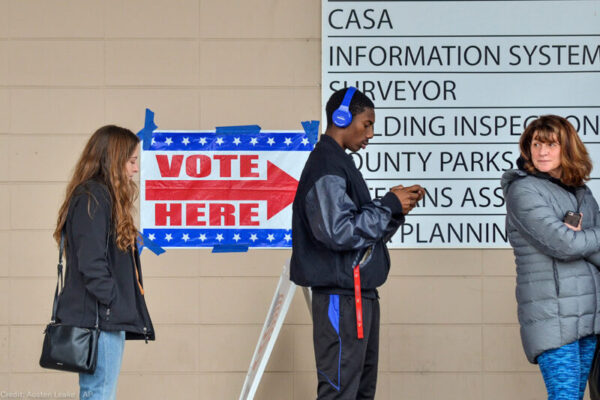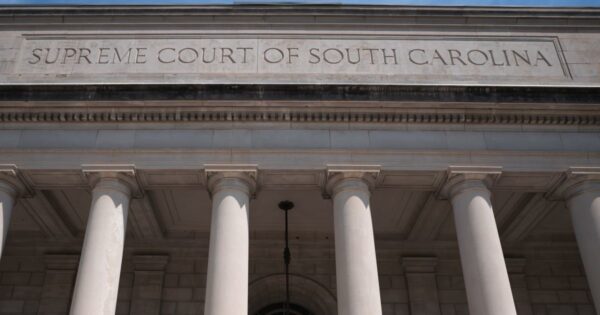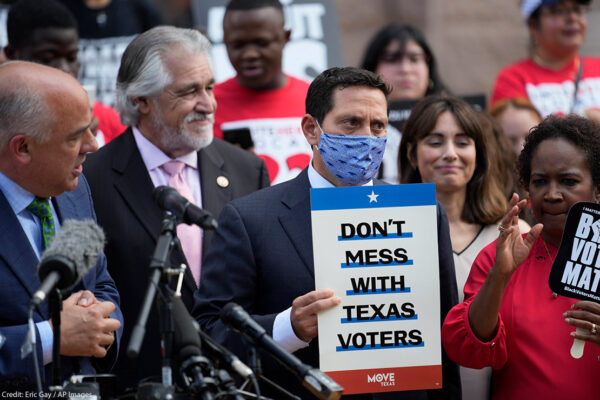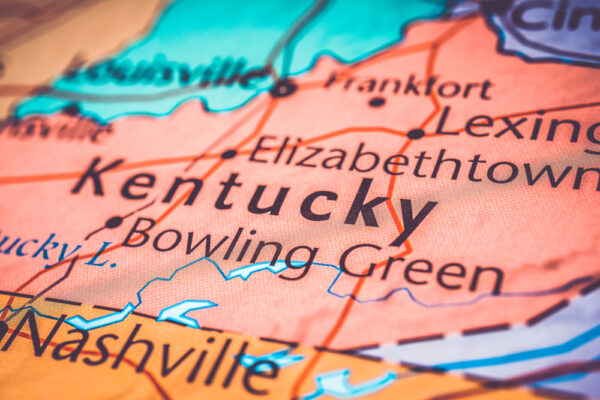Supreme Court Term 2024-2025
We’re breaking down the cases we've asked the court to consider this term.
Latest Case Updates
Ongoing
Updated June 23, 2025
Ongoing
Updated June 13, 2025
Closed (Judgment)
Updated June 6, 2025
Ongoing
Updated May 8, 2025
Featured
Georgia Supreme Court
Jun 2025

Voting Rights
Eternal Vigilance Action, Inc. v. Georgia
The ë–ƒVlogand partner organizations intervened in this case to represent the rights of voters and voting-rights organizations in a case challenging a number of rules passed by the Georgia State Election Board. We challenged the rule requiring that the number of votes cast be hand counted at the polling place prior to the tabulation of votes. In a critical victory for Georgia voters, in June 2025, the Georgia Supreme Court upheld a lower court‚Äôs decision permanently blocking the rule requiring hand counting of ballots at polling places before tabulation ‚Äî a process widely criticized for risking delays, ballot spoliation, and voter disenfranchisement.
U.S. Supreme Court
May 2025

Voting Rights
Racial Justice
Allen v. Milligan
Whether Alabama’s congressional districts violate Section 2 of the Voting Rights Act because they discriminate against Black voters. We succeeded in winning a new map for 2024 elections which, for the first time, has two congressional district that provide Black voters a fair opportunity to elect candidates of their choosing despite multiple attempts by Alabama to stop us at the Supreme Court. Despite this win, Alabama is still defending its discriminatory map, and a trial was held in February 2025 to determine the map for the rest of the decade.
In May 2025, a federal court ruled that Alabama's 2023 congressional map both violates Section 2 of the Voting Rights Act and was enacted by the Alabama Legislature with racially discriminatory intent.
Washington, D.C.
Apr 2025

Voting Rights
League of Women Voters Education Fund v. Trump
On March 25, 2025, in a sweeping and unprecedented Executive Order, President Trump attempted to usurp the power to regulate federal elections from Congress and the States. Among other things, the Executive Order directs the Election Assistance Commission—an agency that Congress specifically established to be bipartisan and independent—to require voters to show a passport or other citizenship documentation in order to register to vote in federal elections. If implemented, the Executive Order would threaten the ability of millions of eligible Americans to register and vote and upend the administration of federal elections.
On behalf of leading voter registration organizations and advocacy organizations, the ë–ƒVlogand co-counsel filed a lawsuit to block the Executive Order as an unconstitutional power grab.
Maryland
Apr 2025

Religious Liberty
LGBTQ Rights
Mahmoud v. Taylor
On April 9, 2025, the ë–ƒVlogand ë–ƒVlogof Maryland filed an amicus brief with the U.S. Supreme Court supporting the Montgomery County Public Schools (MCPS) in its efforts to ensure that its English Language Arts curriculum is LGBTQ-inclusive.
U.S. Supreme Court
Mar 2025

Voting Rights
Callais v. Landry
Whether the congressional map Louisiana adopted to cure a Voting Rights Act violation in Robinson v. Ardoin is itself unlawful as a gerrymander.
New Hampshire
Mar 2025

Voting Rights
Coalition for Open Democracy v. Scanlan
This lawsuit challenges HB 1569, a new law that will make New Hampshire the only state to require every person to produce documentary proof of citizenship when they register to vote for both state and federal elections. It also challenges HB 1569’s elimination a preexisting protection for voters—namely, an affidavit option that allowed voters who faced surprise challenges to their eligibility at the polls to swear to their qualifications and cast a ballot. Accordingly, HB 1569 violates the First and Fourteenth Amendments of the U.S. Constitution by placing substantial burdens on New Hampshirites at all stages of the voting process, and will arbitrarily disenfranchise hundreds, if not thousands of qualified voters.
South Carolina Supreme Court
Jan 2025

Voting Rights
League of Women Voters of South Carolina v. Alexander
This case involves a state constitutional challenge to South Carolina’s 2022 congressional redistricting plan, which legislators admit was drawn to entrench a 6-1 Republican majority in the state’s federal delegation. Plaintiff the League of Women Voters of South Carolina has asked the state’s Supreme Court to conclude that the congressional map is an unlawful partisan gerrymander that violates the state constitution.
Texas
Oct 2024

Voting Rights
OCA-Greater Houston v. Paxton
Texas has growing Hispanic and Black populations that helped propel record voter turnout in the November 2020 election. The Texas Legislature responded to this increased civic participation with an omnibus election bill titled Senate Bill 1—SB 1 for short—that targeted election practices that made voting more accessible to traditionally marginalized voters like voters of color, voters with disabilities, and voters with limited English proficiency. Since 2021, SB 1 has resulted in tens of thousands of lawful votes being rejected, and it remains a threat to democracy in Texas.
Ohio
Sep 2024

Reproductive Freedom
Planned Parenthood Southwest Ohio Region et al., v. Ohio Department of Health, et al.
The ë–ƒVlog, the ë–ƒVlogof Ohio, Planned Parenthood Federation of America, the law firm WilmerHale, and Fanon Rucker of the Cochran Law Firm, on behalf of Planned Parenthood Southwest Ohio Region, Planned Parenthood of Greater Ohio, Preterm-Cleveland, Women‚Äôs Med Group Professional Corporation, Dr. Sharon Liner, and Julia Quinn, MSN, BSN, amended a complaint in an existing lawsuit against a ban on telehealth medication abortion services to bring new claims under the Ohio Reproductive Freedom Amendment, including additional challenges to other laws in Ohio that restrict access to medication abortion in the state.
All Cases
1,585 Court Cases

Kentucky Supreme Court
Nov 2023
Voting Rights
Commonwealth of Kentucky v. Graham (Amicus)
State legislatures are responsible for creating state legislative and U.S. congressional districts. In 2019, the U.S. Supreme Court held in Rucho v. Common Cause that federal courts have no authority to review claims that states have sorted voters along partisan lines to favor one political party over others. However, challenges to partisan gerrymandering continue in many state courts, and this case involves one such constitutional challenge in Kentucky.
Explore case
Kentucky Supreme Court
Nov 2023

Voting Rights
Commonwealth of Kentucky v. Graham (Amicus)
State legislatures are responsible for creating state legislative and U.S. congressional districts. In 2019, the U.S. Supreme Court held in Rucho v. Common Cause that federal courts have no authority to review claims that states have sorted voters along partisan lines to favor one political party over others. However, challenges to partisan gerrymandering continue in many state courts, and this case involves one such constitutional challenge in Kentucky.

New Jersey Supreme Court
Nov 2023
Women's Rights
Free Speech
Usachenok v. State of New Jersey
The New Jersey Department of Treasury maintains a policy that requires employers investigating workplace discrimination to ‚Äúrequest‚Äù confidentiality from all witnesses with respect to any information related to the investigation. This case involves whether a confidentiality policy of this kind violates the free speech rights under the New Jersey Constitution of state employees who are witnesses, and whether those rights are broader than the U.S. Constitution‚Äôs First Amendment free speech right. The ACLU‚Äôs State Supreme Court Initiative and Women‚Äôs Rights Project, along with the ë–ƒVlogof New Jersey, filed an amicus brief in the New Jersey Supreme Court, urging that court to revive a government employee‚Äôs speech claim challenging the confidentiality policy and to interpret the New Jersey Constitution‚Äôs speech protection more broadly than federal constitutional law. In April 2024, the New Jersey Supreme Court ruled in our favor and reversed the judgment of the Appellate Division.
Explore case
New Jersey Supreme Court
Nov 2023

Women's Rights
Free Speech
Usachenok v. State of New Jersey
The New Jersey Department of Treasury maintains a policy that requires employers investigating workplace discrimination to ‚Äúrequest‚Äù confidentiality from all witnesses with respect to any information related to the investigation. This case involves whether a confidentiality policy of this kind violates the free speech rights under the New Jersey Constitution of state employees who are witnesses, and whether those rights are broader than the U.S. Constitution‚Äôs First Amendment free speech right. The ACLU‚Äôs State Supreme Court Initiative and Women‚Äôs Rights Project, along with the ë–ƒVlogof New Jersey, filed an amicus brief in the New Jersey Supreme Court, urging that court to revive a government employee‚Äôs speech claim challenging the confidentiality policy and to interpret the New Jersey Constitution‚Äôs speech protection more broadly than federal constitutional law. In April 2024, the New Jersey Supreme Court ruled in our favor and reversed the judgment of the Appellate Division.

Nevada Supreme Court
Nov 2023
Criminal Law Reform
Smart Justice
Cannabis Equity & Inclusion Community v. Nevada Board of Pharmacy
Nevadans, like voters in many states, have chosen to legalize marijuana for medicinal and recreational use. In Nevada, these changes—adopted through citizen ballot initiatives and, in the case of medical marijuana, enshrined in the Nevada Constitution—were intended to ensure that marijuana is regulated much like alcohol and that law enforcement resources are focused on violent crime, not the prosecution of non-violent drug offenses. Despite these legal changes, Nevada’s Board of Pharmacy continues to regulate marijuana as a Schedule I controlled substance for purposes of state law, akin to the Board’s treatment of cocaine and fentanyl. The Board’s scheduling designation for marijuana has enormous implications for criminal defendants in Nevada since state law makes it a felony to possess or engage in certain other activity with respect to a Schedule I controlled substance, as designated by the Board.
This case, brought by an individual and organization harmed by the Board‚Äôs scheduling designation for marijuana, involves the question whether the designation violates the Nevada Constitution and state statutes. The ë–ƒVlogof Nevada is counsel in the case, and the ACLU‚Äôs State Supreme Court Initiative is co-counsel on appeal.
In August 2024, the Court held that Pool and CEIC lack standing to challenge marijuana's designation as a Schedule I substance but recognized that other individuals could appropriately do so in the future. The Court did not reach the merits in reversing the district court’s positive decision.
Explore case
Nevada Supreme Court
Nov 2023

Criminal Law Reform
Smart Justice
Cannabis Equity & Inclusion Community v. Nevada Board of Pharmacy
Nevadans, like voters in many states, have chosen to legalize marijuana for medicinal and recreational use. In Nevada, these changes—adopted through citizen ballot initiatives and, in the case of medical marijuana, enshrined in the Nevada Constitution—were intended to ensure that marijuana is regulated much like alcohol and that law enforcement resources are focused on violent crime, not the prosecution of non-violent drug offenses. Despite these legal changes, Nevada’s Board of Pharmacy continues to regulate marijuana as a Schedule I controlled substance for purposes of state law, akin to the Board’s treatment of cocaine and fentanyl. The Board’s scheduling designation for marijuana has enormous implications for criminal defendants in Nevada since state law makes it a felony to possess or engage in certain other activity with respect to a Schedule I controlled substance, as designated by the Board.
This case, brought by an individual and organization harmed by the Board‚Äôs scheduling designation for marijuana, involves the question whether the designation violates the Nevada Constitution and state statutes. The ë–ƒVlogof Nevada is counsel in the case, and the ACLU‚Äôs State Supreme Court Initiative is co-counsel on appeal.
In August 2024, the Court held that Pool and CEIC lack standing to challenge marijuana's designation as a Schedule I substance but recognized that other individuals could appropriately do so in the future. The Court did not reach the merits in reversing the district court’s positive decision.

Utah Supreme Court
Nov 2023
Prisoners' Rights
Natalie R. v. State of Utah
In recent years, federal courts have relied on what’s called the “political question doctrine” to refuse to review legal claims of wrongdoing, even those involving egregious constitutional harm. Using the political question doctrine, federal courts have turned away claims from people seeking justice on the theory that court review of those claims would embroil the courts in matters best left to the political process. Whether state courts should adopt a parallel political question doctrine—and thus limit access to justice for people whose civil rights and liberties have been violated—is an open question in many states. This case involves the scope of Utah courts’ authority to review important constitutional claims.
Explore case
Utah Supreme Court
Nov 2023

Prisoners' Rights
Natalie R. v. State of Utah
In recent years, federal courts have relied on what’s called the “political question doctrine” to refuse to review legal claims of wrongdoing, even those involving egregious constitutional harm. Using the political question doctrine, federal courts have turned away claims from people seeking justice on the theory that court review of those claims would embroil the courts in matters best left to the political process. Whether state courts should adopt a parallel political question doctrine—and thus limit access to justice for people whose civil rights and liberties have been violated—is an open question in many states. This case involves the scope of Utah courts’ authority to review important constitutional claims.

Maine Supreme Court
Nov 2023
Free Speech
State v. Labbe
This free-speech case concerns a prosecution for ‚Äústalking‚Äù based on evidence of a defendant‚Äôs speech alone, without any requirement of subjective intent. Freedom of speech is a bedrock protection of both the Maine Constitution and the United States Constitution. This protection requires, at minimum, that a criminal defendant cannot be prosecuted for stalking carried out via speech alone unless the state proves a subjective-intent element beyond a reasonable doubt. This protection ensures that states do not prosecute and punish people for their protected speech. In October 2023, the ë–ƒVlogand the ë–ƒVlogof Maine filed an amicus brief in the Supreme Judicial Court of Maine, asking the court to vacate a defendant‚Äôs stalking conviction that was based on his speech alone, without any evidence as to subjective intent.
Explore case
Maine Supreme Court
Nov 2023

Free Speech
State v. Labbe
This free-speech case concerns a prosecution for ‚Äústalking‚Äù based on evidence of a defendant‚Äôs speech alone, without any requirement of subjective intent. Freedom of speech is a bedrock protection of both the Maine Constitution and the United States Constitution. This protection requires, at minimum, that a criminal defendant cannot be prosecuted for stalking carried out via speech alone unless the state proves a subjective-intent element beyond a reasonable doubt. This protection ensures that states do not prosecute and punish people for their protected speech. In October 2023, the ë–ƒVlogand the ë–ƒVlogof Maine filed an amicus brief in the Supreme Judicial Court of Maine, asking the court to vacate a defendant‚Äôs stalking conviction that was based on his speech alone, without any evidence as to subjective intent.
